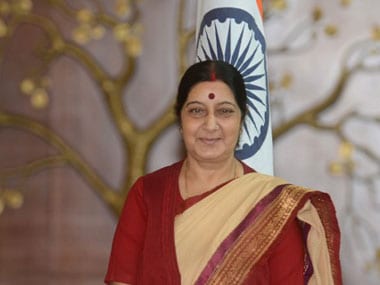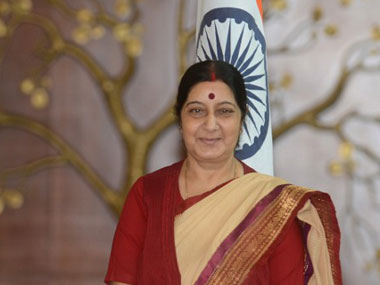By Seema Guha India has not yet made a formal announcement. Yet indications are that External Affairs Minister Sushma Swaraj, will be heading for Islamabad on 9 December for the Heart of Asia conference, hosted by Pakistan. It will be a baby step to initiate a rapprochement between the two feuding neighbours. If she does, it is an indication that the Paris tete-a-tete between Prime Minister Narendra Modi and Pakistan’s Nawaz Sharif has been an ice-breaker. Though formal talks between India and Pakistan may take quite a while, the Swaraj visit will be a step at building a better atmosphere. [caption id=“attachment_2481932” align=“alignleft” width=“380”]
 Sushma Swaraj. AFP[/caption] The Heart of Asia Conference The heart of Asia conference is focused in getting Afghanistan’s neighbours, Turkey, Pakistan, Russia, China, Iran, India and the Central Asian Republics to work together for stabilizing the security situation and helping to co-operate in its economic development. Turning Afghanistan into a communication and transport hub is also the ultimate aim of the project. Ironically before the Istanbul process was underway and the heart of Asia Conference was being planned, Pakistan tried its best to keep India out. At that time, Pakistan anxious about India spreading its footprints in Afghanistan, had used the Haqqani network to bomb the Indian embassy in Kabul, and attack Indian workers building the crucial road connecting the Chabahar port in Iran to Afghanistan. However, despite its best efforts, Pakistan did not succeed in keeping India out, as former president Hamid Karzai had batted for New Delhi. Not that the Heart of Asia process has made much of an impact in stabilising Afghanistan, but the effort backed by the UN, US and EU continues. India is now very much a part of the process, and Swaraj is being invited to the foreign minsiter’s meet being held in Islamabad. While Swaraj’s main motive will be to participate in the conference, the visit will also give her an opportunity to talk to Pakistan on bilateral relations. During the Commonwealth Conference held in Malta last month, Sushma Swaraj has stressed on the need to work on humanitarian issues which has plagued citizens on both sides of the border. After the post Ufa fiasco, when talks between the National Security Advisors of India and Pakistan were called off, the two countries are concentrating on Track 11 level dialogue, in an effort to build up the right atmosphere. Informal contacts between Modi and Sharif have continued, as Barkha Dutt reveals in her new book about an hour-long meeting in 2014 during the SAARC summit in Kathmandu. While the media got just the story of a handshake during the retreat, the two leaders did meet. Though the peace talks have remained stuck, it is now clear that Prime Minster Narendra Modi is as keen as Nawaz Sharif to break the deadlock. Modi and Sharif have to proceed with caution Despite being a strong leader, Modi cannot ignore either the RSS or his core support base. Pakistan has long been the punching bag for the Hindutva brigade. So the PM will have to move with some caution and create the right ambience for talks to proceed. That may take some time, because when it comes to India and Pakistan, pressure groups on both sides of the border do their best to disrupt the move. Terror attacks have often occurred to derail attempts at peace. It is evident that behind the scenes groundwork is being done and both sides are waiting for the right time to begin consultations. This is good news considering that many hardliners of the BJP and its extended Parivar believe that New Delhi should ignore Pakistan. The Pakistan military is a thorn on Nawaz Sharif’s side. Despite his best efforts, Sharif has not been able to keep the army in check and the military continue to dictate Pakistan’s policy towards India, US and Afghanistan. Pakistan military is bent on ensuring that India¹s wings are clipped in Afghanistan. The psychological impact of the dismemberment of Pakistan, with the creation of Bangladesh with India’s help, remains deeply embedded in the Pakistan army. They fear that Pakistan can again be squeezed by India from the east as well as from the west, if New Delhi is allowed more space in Afghanistan. Little can be done to allay such fears unless India and Pakistan begin peace talks. But here too the army remains a major stumbling block. There are problems on both sides. The best way forward is to have talks away from prying eyes. Otherwise there is so much of chatter and outcry on both sides that it is difficult to proceed because of domestic pressure. If Sushma Swaraj does go to Islamabad as is being speculated, it will give an impetus to the peace move. Besides that not much can be expected immediately.
Sushma Swaraj. AFP[/caption] The Heart of Asia Conference The heart of Asia conference is focused in getting Afghanistan’s neighbours, Turkey, Pakistan, Russia, China, Iran, India and the Central Asian Republics to work together for stabilizing the security situation and helping to co-operate in its economic development. Turning Afghanistan into a communication and transport hub is also the ultimate aim of the project. Ironically before the Istanbul process was underway and the heart of Asia Conference was being planned, Pakistan tried its best to keep India out. At that time, Pakistan anxious about India spreading its footprints in Afghanistan, had used the Haqqani network to bomb the Indian embassy in Kabul, and attack Indian workers building the crucial road connecting the Chabahar port in Iran to Afghanistan. However, despite its best efforts, Pakistan did not succeed in keeping India out, as former president Hamid Karzai had batted for New Delhi. Not that the Heart of Asia process has made much of an impact in stabilising Afghanistan, but the effort backed by the UN, US and EU continues. India is now very much a part of the process, and Swaraj is being invited to the foreign minsiter’s meet being held in Islamabad. While Swaraj’s main motive will be to participate in the conference, the visit will also give her an opportunity to talk to Pakistan on bilateral relations. During the Commonwealth Conference held in Malta last month, Sushma Swaraj has stressed on the need to work on humanitarian issues which has plagued citizens on both sides of the border. After the post Ufa fiasco, when talks between the National Security Advisors of India and Pakistan were called off, the two countries are concentrating on Track 11 level dialogue, in an effort to build up the right atmosphere. Informal contacts between Modi and Sharif have continued, as Barkha Dutt reveals in her new book about an hour-long meeting in 2014 during the SAARC summit in Kathmandu. While the media got just the story of a handshake during the retreat, the two leaders did meet. Though the peace talks have remained stuck, it is now clear that Prime Minster Narendra Modi is as keen as Nawaz Sharif to break the deadlock. Modi and Sharif have to proceed with caution Despite being a strong leader, Modi cannot ignore either the RSS or his core support base. Pakistan has long been the punching bag for the Hindutva brigade. So the PM will have to move with some caution and create the right ambience for talks to proceed. That may take some time, because when it comes to India and Pakistan, pressure groups on both sides of the border do their best to disrupt the move. Terror attacks have often occurred to derail attempts at peace. It is evident that behind the scenes groundwork is being done and both sides are waiting for the right time to begin consultations. This is good news considering that many hardliners of the BJP and its extended Parivar believe that New Delhi should ignore Pakistan. The Pakistan military is a thorn on Nawaz Sharif’s side. Despite his best efforts, Sharif has not been able to keep the army in check and the military continue to dictate Pakistan’s policy towards India, US and Afghanistan. Pakistan military is bent on ensuring that India¹s wings are clipped in Afghanistan. The psychological impact of the dismemberment of Pakistan, with the creation of Bangladesh with India’s help, remains deeply embedded in the Pakistan army. They fear that Pakistan can again be squeezed by India from the east as well as from the west, if New Delhi is allowed more space in Afghanistan. Little can be done to allay such fears unless India and Pakistan begin peace talks. But here too the army remains a major stumbling block. There are problems on both sides. The best way forward is to have talks away from prying eyes. Otherwise there is so much of chatter and outcry on both sides that it is difficult to proceed because of domestic pressure. If Sushma Swaraj does go to Islamabad as is being speculated, it will give an impetus to the peace move. Besides that not much can be expected immediately.
Breaking the impasse: Will India, Pakistan make the right moves at the Heart of Asia meet?
FP Archives
• December 3, 2015, 22:20:46 IST
Though formal talks between India and Pakistan may take quite a while, the Swaraj visit will be a step at building a better atmosphere.
Advertisement
)